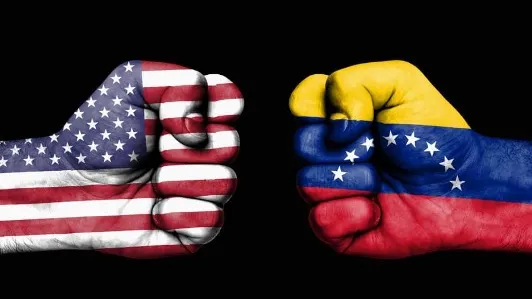On Monday, President Donald Trump announced a significant shift in U.S. policy regarding Venezuelan oil exports, declaring that the United States will impose a 25% tariff on countries that purchase oil and gas from Venezuela. This measure aims to intensify pressure on the Maduro regime and strategically counteract China’s growing influence in the Latin American nation. The tariffs will take effect on April 2, 2024, marking a pivotal moment in U.S. foreign policy and international trade relations.
During a press conference at the White House, President Trump emphasized that any nation opting to buy Venezuelan oil would incur a substantial additional charge on their trade with the United States. “If they buy their oil from Venezuela, they have to pay a 25% tariff to do business with the United States — that’s on top of existing tariffs,” Trump affirmed via a post on his social media platform, Truth Social. This move is part of a broader strategy to isolate Brazil’s socialist government under Nicolás Maduro, which has faced extensive condemnation for its human rights abuses and economic mismanagement.
In 2024, Venezuela exported approximately 660,000 barrels of oil daily, with China emerging as the largest recipient, accounting for 270,000 barrels per day (bpd) last year. According to Matt Smith, an oil analyst at Kpler, the announcement aligns with the Trump administration’s persistent focus on countering Chinese domination in Latin American oil markets. This perspective was echoed by Roth analyst Leo Mariani, who projected that oil prices would likely surge in response to the tariff announcement, potentially escalating further depending on Trump’s subsequent actions.
In 2023, the United States stood as the second-largest importer of Venezuelan crude oil, receiving around 233,000 bpd, while other nations, including India and Spain, accounted for 61,000 bpd and nearly 60,000 bpd, respectively. As the United States seeks to reassert itself in the global oil market, the implementation of tariffs is positioned to complicate economic relations for those nations engaged in purchasing Venezuelan oil, especially given the strategic motivations underlying these tariffs.
The Trump administration’s approach is informed by national security concerns, particularly allegations regarding the presence of Tren de Aragua—an organized crime group accused of trafficking violence and criminality from Venezuela to the U.S. During the announcement, Trump asserted that members of this gang were involved in activities deemed as “irregular warfare,” framing the situation as a direct threat to U.S. security. The designation of Tren de Aragua as a foreign terrorist organization underscores the administration’s commitment to curtailing perceived threats emanating from the Maduro regime.
Adding another layer to this complex geopolitical scenario, the U.S. Treasury Department has extended Chevron’s license to operate in Venezuela until May 27, 2024. This decision comes in the wake of Chevron’s lobbying efforts to maintain its interests in the Venezuelan oil sector amid shifting regulatory frameworks. Chevron has long been affiliated with Petróleos de Venezuela, the national oil company, and the extension of its operational license suggests a continued partnership despite the broader geopolitical tensions. Conversely, Trump has expressed intentions to reverse decisions made by the Biden administration regarding Chevron’s operational capabilities in Venezuela, signaling a clear departure from previous diplomatic engagements.
Moreover, Trump’s invocation of the 1798 Alien Enemies Act reflects a dramatic legal maneuver in light of growing domestic security concerns. His call for action against alleged members of Tren de Aragua, combined with recent legal challenges—including a block from Federal District Court Judge James Boasberg—highlights the contentious balance between national security initiatives and judicial processes. The interplay between federal authority and legal constraints beckons critical discussions on governance and constitutional interpretations within the United States, leading to fears of an emerging constitutional crisis.
As these developments unfold, the implications for global oil markets remain a central focus. The potential for rising oil prices in response to these tariffs could exacerbate an already volatile market, affecting consumers and industries dependent on stable oil prices. Additionally, as international relations evolve, the U.S.’s positioning against Venezuela—and by extension, against China—could redefine energy alliances and economic partnerships across the Americas.
In conclusion, President Trump’s announcement underscores a multifaceted strategy aimed at diminishing Venezuelan influence while reinforcing U.S. interests in the global oil landscape. As the situation progresses, both diplomatic and economic outcomes will warrant close observation, particularly in the context of U.S.-Venezuela relations and the broader implications for energy security. The intersection of national security, international trade, and global oil markets will undoubtedly shape a new chapter in U.S. foreign policy dynamics as April 2 approaches.

